Like many baseball dads out there, I’m often tempted by the lure of buying the very best bats on the market for my boys. The exorbitant cost is somehow a small price to pay when weighed against grandiose visions of baseballs rocketing over fences. Of course, a bat’s quality is irrelevant without solid hitting fundamentals. But coupled with diligent practice and a player with a driven mindset, I’m convinced that a high-end bat is an investment worth making.
With two ball-playing sons, the annual pre-season financial sting is not chump change. Plunking down big bucks on (at least) two new bats nearly every year can be hard to justify. However, by following some simple (and somewhat common sense) guidelines, you can put a decent portion of that yearly outlay back into your pocket. How? Through that magical wonderland of internet commerce known as eBay, of course!
 Step 1: Target the Pre-Season
Step 1: Target the Pre-Season
To maximize the number of potential bat shoppers and bidders, consider your calendar. Even though there is very little “off-season” any more with the plenitude of winter training facilities, demand still spikes for baseball equipment in the months of January through March. Bargain-savvy parents and coaches hit the web just after the new year, looking to gear up their kids. Avoid the time period immediately following the season, generally August and September for youth leagues (although there could be a niche market here for fall ball parents). Baseball burnout will be in effect for many after a full summer of games, and thoughts commonly turn to other sports.
Step 2: Clean it up!
As with anything that you would prepare to sell, cleanup is an essential first step. But don’t go too crazy here. It’s a used bat after all, and potential buyers expect to see reasonable signs of wear; scratches, ball marks, chipped paint and soiled grips are part of the deal. Use a sponge with a mild dish soap to remove surface dirt, and scrub off any marks that will come off easily. Mr. Clean Magic Erasers also work nicely, and will remove stubborn marks with a bare minimum of elbow grease. Don’t worry about cleaning the bat handle. Potential buyers will look beyond a worn bat grip, knowing that a new Lizard Skins™ is an easy, low-cost replacement that will often be just as good (if not better) than the original.
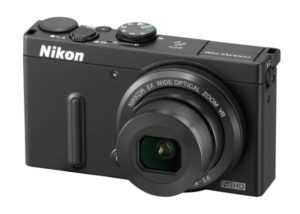 Step 3: Shoot it Right!
Step 3: Shoot it Right!
Location and Light
As anyone who has sold something on eBay can attest, quality photos are the key to a successful auction. Photos from a compact camera or mobile phone will suffice, provided they are clear, crisp and shot in a well-lit setting. Outdoors is preferable, using ambient light to make your photos look natural. If indoors, a spot near a large window is ideal, as long as intense sunlight does not wash out your photographs. Again, natural light is your friend. Wherever you shoot, try to avoid using a flash – it can create “hot spots” on the bat and alter the bat’s normal color. Also, choose a neutral backdrop for your photos that will make your bat “pop”. In the examples below, the bat was shot on a neutral-toned Berber carpet. Other suitable backgrounds include hardwood, concrete or monotone ceramic tile.
What do the Photos Need to Show?
More photos are better than less, but six basic angles will suffice. These should all be shot fairly close-up to illustrate the condition of your bat and support the description you provide (which is covered next).
1. Full end-to-end

2. Barrel (front side)
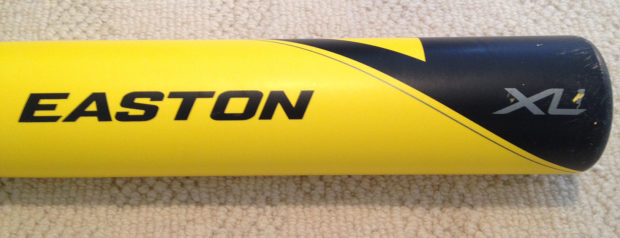
3. Barrel (back side)
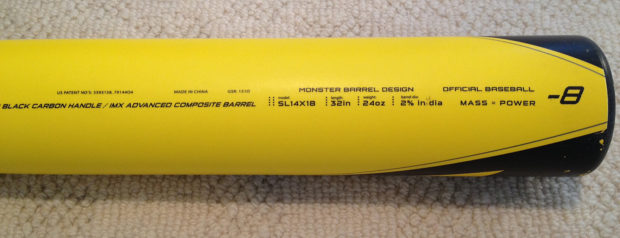
4. Handle/barrel connection
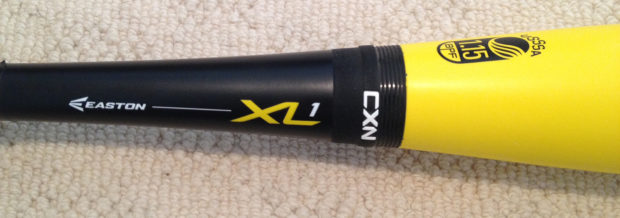
5. Grip/knob
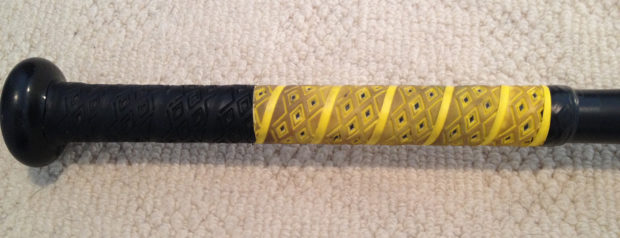
6. End cap (showing no gap between barrel and end cap)
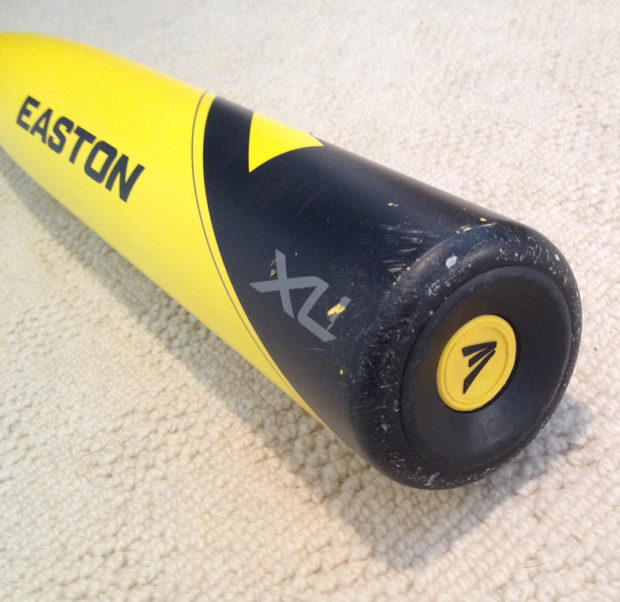
Step 4: Your Words have Power!
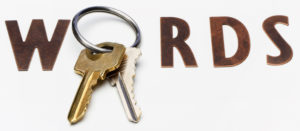 Key Words are Key
Key Words are Key
Pretend that YOU are the potential eBay buyer. How would you search for a specific bat? You would most likely use a small number of specific key words to quickly find the exact bat you are looking for. For example, if you’re searching for a 32-inch bat with an 8-ounce weight drop, you might enter “Easton XL1 32 24 big barrel bat”. I wrote the description below when selling my son’s senior league Easton XL1 a couple of years ago. Notice how all of those key words are included either in the title, in the description, or both:
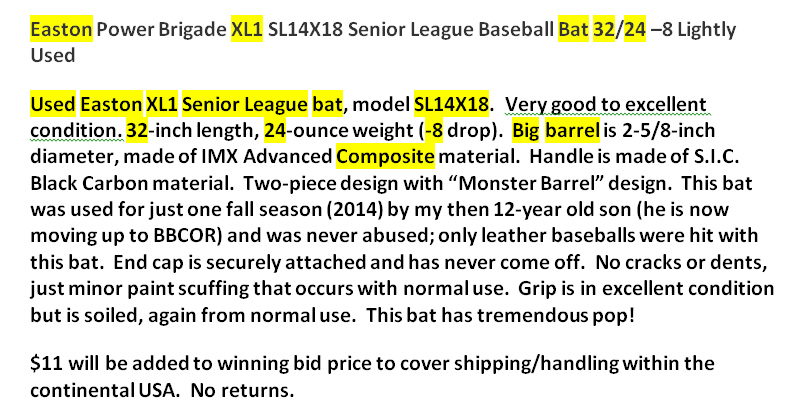
But also notice how I included a wide range of additional key words in the description that someone might use, such as “Used”, “-8”, “Senior League”, “composite” and “SL14X18”, the bat’s specific model number. Using as many key words as possible will ensure that your listing will come up in lots of searches.
Bat Description: Just the Facts, Jack.
When writing the description, stick to the facts, be honest and don’t embellish. Potential buyers don’t want to read through a bunch of glittery copy. They want nuts and bolts. Don’t rewrite the entire manufacturer’s description either, but include basics: length, weight, barrel diameter, type of composite or metal material, etc. And tell them YOUR history with the bat: why you are selling, how much it was used and offer an honest assessment of the bat’s condition.
Notice in the above description that I added other tidbits that a buyer might like to know, such as “only leather baseballs were hit with this bat” (implying no damaging plastic cage balls were hit) and “end cap is securely attached”, which has at times been an issue with Easton bats.
One more thing: two big words at the end of the description could save you some headaches: No Returns. That’s your disclaimer, just in case the bat explodes into many pieces on its first swing in the hands of its new owner. Chances are that won’t happen if your bat is not already on its last legs, but you never know – especially if it’s a wood bat. For good measure, you might even add “all sales final”.
So how did my listing fare? After a 7-day auction, the winning bid was $142.50, or approx. $97.50 less than I paid for it new. Even though the bat was only used for one season, that’s a win in my book.
Step 5: The Price is Right!
You will probably go into the auction with an idea of how much you’d like to get for your bat, knowing what you originally paid for it. Resist the temptation, however, to set a starting bid point close to your target sell price. If you have a minimum price below which you simply cannot part with the bat, set a reserve price while setting up your auction. This will guarantee that you won’t have to give up the bat at a price that is lower than your comfort level.
Typically I start my auctions at $15 to $25, depending on the bat brand and model, its age and condition. Bidders will find a low starting bid more accessible and will be more likely to jump in on the auction at a lower price. Once they’re in, it’s game on – and additional bidders will drive the price higher if your listing is solid. In the last few hours of the auction, a “must-win” mentality sometimes takes over, and creates a social dynamic that overvalues the bat. Bidders will often go higher than planned just to win and relish the joy of victory. As the seller, this is what you hope for!
 Step 6: Pack & Ship!
Step 6: Pack & Ship!
Don’t go nuts here with multiple layers of padding – it’s a bat, and built to be durable – but do pack it securely. Typically I will roll the bat in one layer of bubble wrap and place it into a cardboard shipping tube (I always save the cardboard tubes sent to me when I order a new bat). Ship it insured and trackable, and be sure to state in the auction terms how much of a surcharge you’ll add to the final bid price to cover insured ground shipping.
When your auction is all done, leave feedback for your buyer – a cardinal rule among all eBayers. Often the buyer will reciprocate and leave a kind word for you as well, bolstering your credibility as a preferred seller of fine pre-owned bats.
One Final Thought
If eBay selling is not for you, or if you’ve already accepted your yearly expenditure for bats as the “cost of doing business” for your youth ballplayer, then consider donating your used equipment. Many kids are excluded from baseball for no other reason than its sometimes-prohibitive cost of equipment.
Non-profit organizations like Leveling the Playing Field, All Kids Should Play and Let’s Play it Forward provide used equipment to less-fortunate children and underfunded organizations and ensure that playing baseball and other sports is within reach for all.
